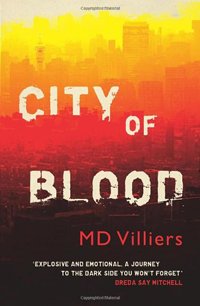
Siphiwe is a 19-year-old orphan living in a shelter. He knows that the time is coming when he must leave to make space for another of Johannesburg’s thousands of street children, but he’s dreading it. For Siphiwe is only too aware of the fate of many young men forced to fend for themselves. However, he is a good man at heart and is trying to find himself a job.
One day, he witnesses the stabbing of a mango seller in the local market and comes to her aid, but he soon realises such actions have consequences. The detectives investigating the case, the impetuous Adrian and his almost psychopathic colleague Robert, initially suspect him, and when they realise his innocence they try to make him divulge the killer. The man responsible works for the ruling crime lord Abaju, otherwise known as ‘the chameleon’, and Siphiwe is drawn into their world after he is seen talking to the police.
Out of a sense of obligation to the women who run the shelter, Siphiwe agrees to help the lady who was stabbed. It turns out her son owes money to some of the local gangsters and has gone into hiding. Siphiwe’s task is to find the son and warn him that it’s not safe for him to return. His search puts him in the path of a rival crime lord, McCarthy Letswe, who is returning to Jo’burg from exile to rebuild his empire. In the centre of his sights is Abaju. Spurred on by his orphan friends Siphiwe sees a chance to play both gangsters off against each other, and at the same time get the police off his back. But the stakes are high and the life of a kid on the streets of South Africa is cheap.
City of Blood works as a crime novel, and as a glimpse of a foreign city and culture. MD Villiers is superb at showing the powerlessness of Siphiwe. The forces that shape his destiny are so powerful, random, and indifferent to his life that his own actions seem to make little difference. Yet, help himself he does, towards what is an unapologetically happy ending. Indeed there is a feel-good factor to the whole book which belies its subject matter and the grim setting.
It is a testament to the author’s skill that Siphiwe can be both innocent and cunning within the same scene. Villiers cleverly makes Siphiwe’s concerns universal, and even readers with no experience of the Jo’burg slums should be able to identify with him. The ending is a little sudden for a crime story, but then this is a human drama in which the crime element sits alongside a coming-of-age story and an exploration of what life’s like for those at the bottom of the pile in the city. South African crime fiction is on something of a high at the moment with the slick thrillers of Deon Meyer, the supernatural scares of Lauren Beukes’ The Shining Girls, and the hardboiled noir of Roger Smith. MD Villiers continues that great run.
Harvill Secker
Print/Kindle
£8.54
CFL Rating: 4 Stars